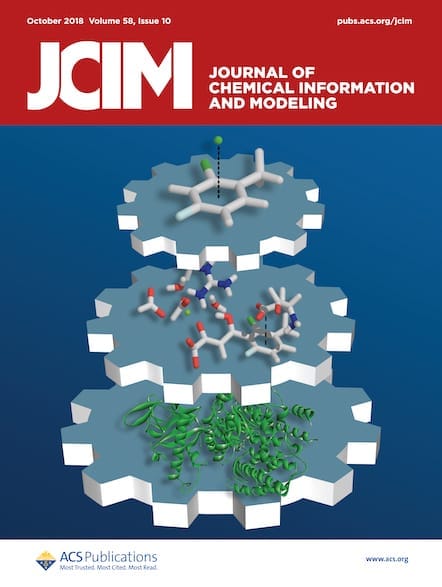Dr. Zoe Cournia is the newest Associate Editor for the Journal of Chemical Information and Modeling. Since joining, she has already spearheaded the journal’s Special Issue on “Women in Computational Chemistry” alongside Dr. Habibah Wahab and Dr. Rommie Amaro. Dr. Cournia was honored in 2014 with the Outstanding Junior Faculty Award in Computational Chemistry from […]

Dr. Zoe Cournia is the newest Associate Editor for the Journal of Chemical Information and Modeling. Since joining, she has already spearheaded the journal’s Special Issue on “Women in Computational Chemistry” alongside Dr. Habibah Wahab and Dr. Rommie Amaro.
Dr. Cournia was honored in 2014 with the Outstanding Junior Faculty Award in Computational Chemistry from ACS, and was the first recipient of the Partnership for Advanced Computing in Europe (PRACE) Ada Lovelace Award for High Performance Computing in 2016. She graduated from the Chemistry Department at the University of Athens and subsequently pursued doctoral studies in the University of Heidelberg, Germany, with Professor Jeremy Smith, and a Postdoctoral Fellowship with Professor William Jorgensen at the Chemistry Department of Yale University.
The Cournia Lab focuses on exploring structure and dynamics of biological systems and linking those to function using computational methods. Her research group employ a wide range of techniques, such as Molecular Dynamics and Monte Carlo simulations, quantum chemical calculations, free energy perturbation simulations, and virtual screening. Cournia co-organizes the yearly Athens Science Festival, visited by over 30,000 visitors per year, aiming to highlight how a career in science can make a difference in improving people’s quality of life!
Read below for some fun facts on Dr. Zoe Cournia.
When did you first decide to go into Computational Chemistry?
“Thousands of chemical reactions happen in your body when you smell a beautiful flower in a summer spring morning. I was pleasantly surprised when I learned in high school that scientists called “chemists” could handle these reactions and even develop drugs that could save millions of lives worldwide. Overwhelmed by chemists’ discoveries, I decided to study Chemistry. Soon enough in my College years, I realized that although it is an amazing science with its reactions, chemicals, funnels, pipettes, benches, and fume hoods, being a chemist makes a huge mess or at least I made one in the lab! Fortunately, I then realized that computers exist and they make things much cleaner. I discovered that today it is possible to build chemicals, study reactions, or even make drugs within a desktop computer by performing virtual experiments in a similar way as the typical chemists. So I became a computational chemist.”
What is your favorite board game?
“My favorite board game is Trivial Pursuit, especially the geography section. I love traveling and learning about other cultures and customs.”
They say cooking is kitchen chemistry. Does that apply to computational chemistry too? What is your favorite dish to cook?
“It definitely does. I think all chemists are born good cooks. I love Greek and Italian food, so my favorite would be either Lasagna or Moussaka. I like cooking with fresh ingredients always, and I am concerned about the potential hazards of chemical additives placed in our food and cosmetics.
I created a free Android app, called “Ingredio”, with which consumers take a picture of the product ingredients, and the app lets them know whether an ingredient has been associated with toxicity, irritation, cancer, or allergies, based on peer-reviewed literature from PubChem. You can download it for free.”
Share your most memorable experience in publishing.
“One of the most memorable experiences thus far in publishing was the editorial on “Women in Computational Chemistry.” I was not sure initially whether it would be well received by the authors, but we have had an overwhelming response in what may be the biggest special issue in JCIM history! I feel that this special issue addressed an unspoken need for female computational chemists to reach out. We hope that it will not only be a platform to disseminate excellent articles, but also to set inspiring examples of female role models and create a network of peers that will instigate change for the new generation of Women in Science in the field of Computational Chemistry.”
What are you looking forward to the most in your editorship with JCIM?
“I am looking forward to many things, a few of them include:
- Joining JCIM efforts to improve the communication of new research findings across computational chemistry applications in all fields of research.
- Enhancing JCIM mission to improve research communication to scientists and to the wider public (social media)
- Promoting publishing excellent science, developments in new tools and technology
- Highlighting current progresses in our field with thematic issues
- Opening a forum for discussion for current challenges in our field and promote change
- Making the strongest effort to catalyze the peer review process and advocate for the role of women in computational chemistry and work with a fantastic and amazingly diverse team of Editors!”
If you were a Science Superhero, what would your Superhero name be and what powers would you have?
“I would be ‘Dr. Drug’ to be able to cure diseases in a single bound, or ‘X-Woman’ with X-ray vision to spot the exact atomic positions in molecules.”
